Business Overview
Since its establishment in 1995, shortly after its establishment, the University Consortium Kyoto has been promoting FD activities in the Kyoto region together with member schools as an organizational initiative for faculty members to improve and enhance their teaching content and methods.
The FD Joint Training Program is a small-group training program for new teachers, teachers who want to relearn the basics of FD, teachers who are interested in FD, and staff working in FD-related departments to acquire basic knowledge of FD, syllabus creation, lesson design and practice, active learning, and grading.
In FY2021, a total of six sessions will be held online (Zoom). * The schedule and contents of the program are subject to change before the start of application.
In fiscal 2021, we also plan to distribute it on-demand for a limited time. * On-demand video will be released only to those who apply for each session.
* Due to problems during distribution, the recorded video may not be available. Thank you for your understanding.
Outline of the event
In fiscal 2021, the program will be conducted with the following contents.
| Date and time of the | program | period | |
|---|---|---|---|
| 1 | FD Basic | KnowledgeSeptember 7 (Tue) 18:00~20:30 | 20 (Tue) ~ August 31 (Tue) |
| 2Learner-Centered Classroom WorkshopOctober | 9 (Sat) 13:30~15:30 | 1 (Wed) ~ October 2 (Sat) | |
| 3Basic | knowledge about study support for students with disabilitiesOctober | 14 (Thu) 18:30~20:30 | 7 (Tue) ~ October 6 (Wed) |
| 4Are | you able to evaluate the achievement of the test and goals? | November 9 (Tue) 18:30~20:30 | 1 (Fri) ~ November 2 (Tue) |
| 5Workshop | for online | classesDecember 21 (Tue) 18:30~20:30 | 16 (Tue) ~ December 14 (Tue) |
| 6 | Lesson design and improvement to motivate students ~An example of assembling a chemistry student experiment~ |
January 25 (Tue) 18:30~20:30 | 7 (Tue) ~ January 18 (Tue) |
Common to each time
- Target:
- Faculty and staff of universities and junior colleges
*Limited to those who can use Zoom
* Full-time or part-time, and the number of years of work does not matter
* Employees who are interested in FD are also eligible (regardless of number of years of work experience) - Venue:
- Online (via Zoom)
- Participation Fee:
- Faculty and staff of the University Consortium Kyoto member schools: Free For those other than those listed on the left: 1,000 yen (tax included, advance payment required)
* The deadline for payment of the participation fee is as described in the details of each session. Please note that if payment of the participation fee cannot be confirmed within the deadline, the application will be invalid.
If it is difficult to make a payment on time, please contact us as soon as possible using the contact information indicated on the invoice.
*Please note that if you cancel your application after paying the participation fee, the participation fee will not be refunded. - Capacity:
- About 30 people per session (first-come, first-served basis)
- Organizers:
- University Consortium Kyoto
Precautions
- On the day of the event, please participate from a computer or tablet device that has a stable connection to the Internet.
* For workshop-type programs, please refrain from participating from smartphones. - For workshop-style programs, we recommend that you turn on your video microphone.
- Please refrain from recording or recording by participants. Please observe it strictly.
■ Session 1: Basic knowledge of FD
- Schedule:
- Tuesday, September 7, 2021 18:00~20:30
- Format:
- Lecture-based (using Zoom webinars)
- Progress:
- Makoto Sato (Professor, Faculty of Law, Kyoto Sangyo University)
- Lecturer:
- Kenji Otono (Professor, Faculty of Contemporary Social Studies, Kyoto Sangyo University)
Hidehiro Nakajima (Professor, Institute for Educational Development, Ritsumeikan University)
Hidemi Hayashi (Deputy Secretary-General, University Consortium Kyoto)
This training program is mainly for FD beginners. We have in mind those who are interested in FD but don’t know where to start. In this program, participants will first receive information about the University Consortium Kyoto and the FD training opportunities it provides. Next, we will confirm the basic knowledge of FD. One of the indispensable elements of FD is dialogue between faculty and students. In this training, students will learn the basic knowledge (e.g., the significance of the syllabus and how to write it), which is the first step in dialogue between faculty members and students, based on confirming the basic knowledge of FD.
■ 2nd Learner-Centered Classroom Workshop
- Schedule:
- Saturday, October 9, 2021 13:30~15:30
- Format:
- Workshop type (using Zoom meetings)
- Lecturer:
- Hitomi Asada (Associate Professor, Department of Early Childhood Education, Huacho Junior College)
Yuko Kasamatsu (Associate Professor, Department of Environment and Culture, Ikebo Junior College)
Regardless of the field or field, there is a need to shift from conventional one-way knowledge transfer classes to learner-centered classes from the perspective of independent learning. “Active learning” is considered to be one of them. In this training, you will learn about the effects and problems obtained from examples of active learning with an eye on the after-corona. In addition, through workshops, we will create and peer-evaluate actual lesson design plans that incorporate active learning. This year, we hope to be able to exchange information on how to ensure independent learning amid the coronavirus pandemic.
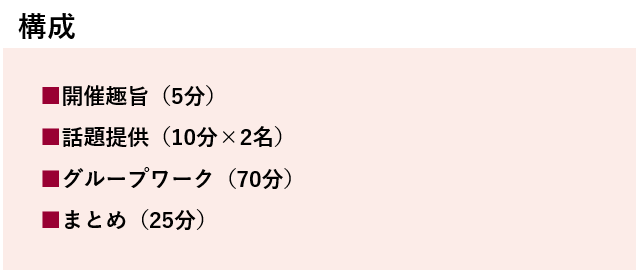
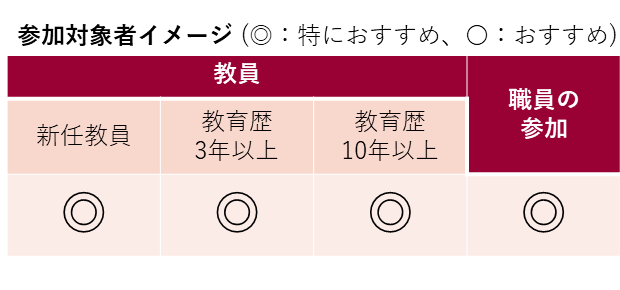
Session 3: Basic knowledge of academic support for students with disabilities
- Schedule:
- Thursday, October 14, 2021 18:30~20:30
- Format:
- Lecture-based (using Zoom webinars)
- Lecturer:
- Jun Murata (Associate Professor, Student Support Center, Kyoto University)
Currently, the student body is becoming more diverse, and each university is required to provide study support to a variety of students. In particular, the need for academic support for students with disabilities has been strengthened by the enactment of the Act on the Elimination of Discrimination against Persons with Disabilities in 2016. In 2021, a bill to amend this law was enacted, and the provision of reasonable accommodations, which was previously only available to national and public universities, has become a legal obligation for private universities and other institutions (until now, it was an obligation to make efforts). In this training, you will first learn basic knowledge about “disability” and then give an overview of the current situation of support for students with disabilities at universities. In addition, it will be an opportunity to think about the basic knowledge of support and specific measures for learning support for students with developmental disabilities, which has been increasing in recent years.
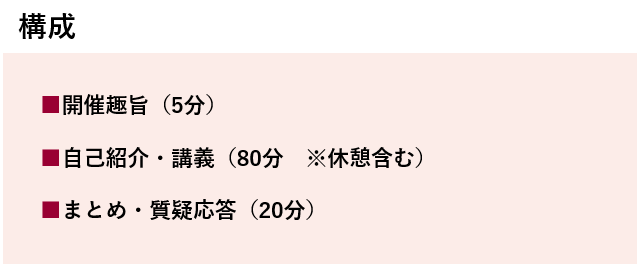
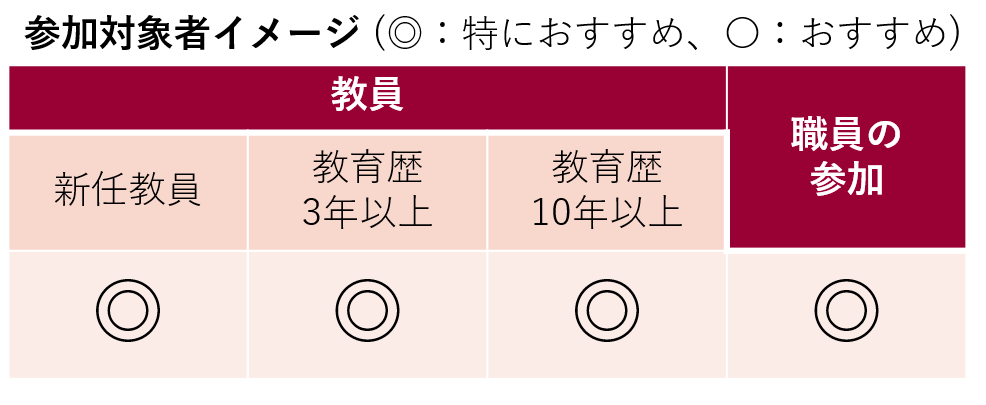
The application has been closed because the capacity has been reached
■ Session 4: Are you able to evaluate the achievement of the test and goals?
- Schedule:
- Tuesday, November 9, 2021 18:30~20:30
- Format:
- Workshop type (using Zoom meetings)
- Progress:
- Naosumi Atoda (Specially Appointed Professor, Faculty of Economics and Business Administration, Kyoto University of Advanced Science)
- Lecturer:
- Hidehiro Nakajima (Professor, Institute for the Promotion of Educational Development, Ritsumeikan University)
Have you ever experienced that a student’s regular exams are not doing well, or that the content is terrible when you assign a report assignment? The teaching ability of the teacher is most evident in the evaluation task. Preparing excellent assessment assignments is beneficial not only to improve student learning outcomes, but also to improve the overall quality of classes, such as reviewing the goals stated in the syllabus and reviewing teaching methods. In this training, in addition to the learning objectives at the subject level, we will discuss how to create exams and assignments that can evaluate the achievement of learning goals at the curriculum level.
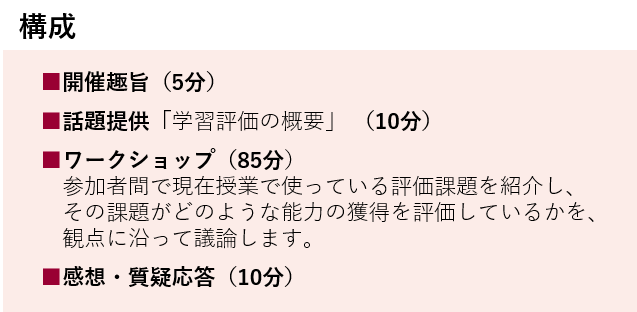
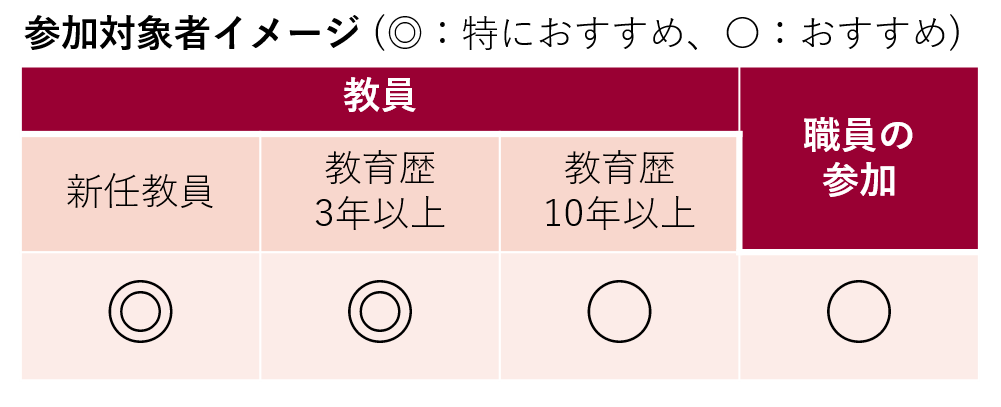
If you are participating, please select one of the subjects you are in charge of and be prepared to introduce the exam questions, report assignments, presentation assignments, etc. of that subject in group work.
* In the case of a written exam, please prepare the exam questions so that you can share the screen on Zoom, and in the case of a performance assignment, the materials when you instruct the student to do the assignment. In addition, you will be introduced to the achievement goals of the subject and the diploma policy, so please prepare the syllabus and diploma policy so that you can share the screen.
■ The 5th Workshop for Online Classes
- Schedule:
- Tuesday, December 21, 2021 18:30~20:30
- Format:
- Workshop type (using Zoom meetings)
- Lecturer:
- Sachiko Ikoma (Associate Professor, Department of Child Education, Ryukoku University Junior College)
Kimie Ito (Professor, Faculty of Child Education, Heian Jogakuin University)
This training is an opportunity to share information on the practice of online classes, which have been implemented in earnest since the spring of 2020. We would like to look back on the efforts to build online classes over the past year while sharing our struggles and joys, and confirm the issues for building better online classes. Why don’t you go beyond the limits of online classes, explore what can only be done in online classes, and think together about class practices that enrich learners’ learning?
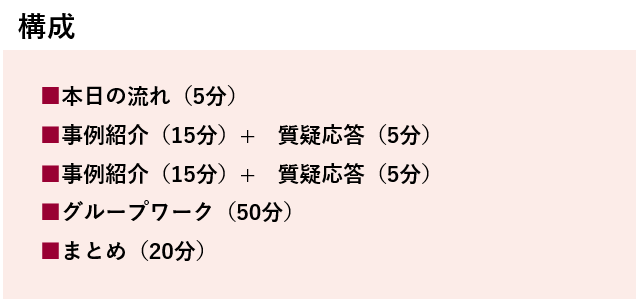
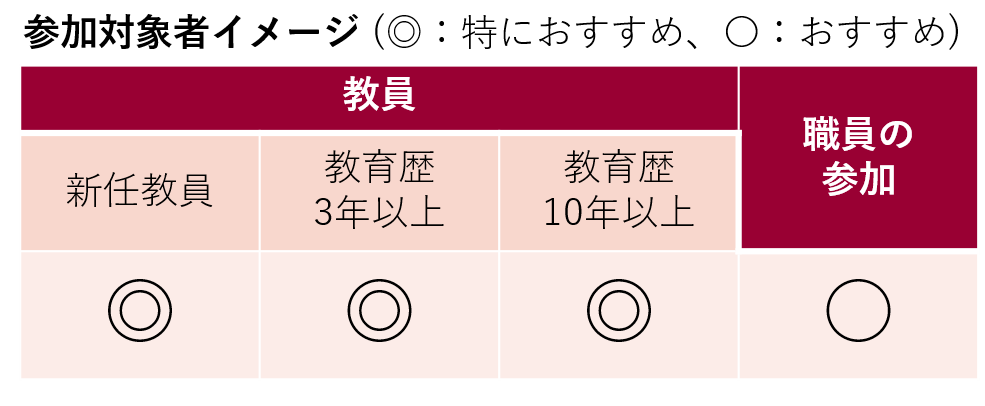
■Session 6: Lesson design and class improvement to motivate students
~An example of assembling a chemistry student experiment~
- Dates:
- Tuesday, January 25, 2022 18:30~20:30
- Format:
- Workshop type (using Zoom meetings)
- Progress:
- Ikuko Takao (Assistant Professor, Department of Pharmaceutical Education, Kyoto University of Pharmacy and Pharmaceutical Sciences)
Chieko Hayashi (Professor, Department of Fundamental Sciences, Kyoto Institute of Technology) - Lecturer:
- Tatsuo Oda (Former Professor, Kyoto Institute of Technology / Part-time Lecturer, Kyoto Sangyo University)
By inspecting and improving existing classes, you can motivate students and lead to more steady learning outcomes.
In this training, we will focus on how to construct an experiment, which has not been covered much in the past, and think about how to motivate students. Experimental subjects are designed to arouse students’ interest in specialized science and engineering subjects and help them understand the specific contents. Depending on how it is constructed, you may lose motivation to continue learning because you do not understand the purpose or interest of the experiment, or conversely, you may open up a new world of knowledge through the experiment. The case study is a chemistry specialist who is still teaching for a wide range of generations, from university lectures to high school-university collaborative classes and recurrent classes. This time, we will use an example of how to construct an easy-to-understand chemistry experiment for high school students, and while answering the questions of the participants, we will all think about how to design and improve the lesson.
For humanities teachers, this will be an opportunity to encounter new ideas and teaching methods.
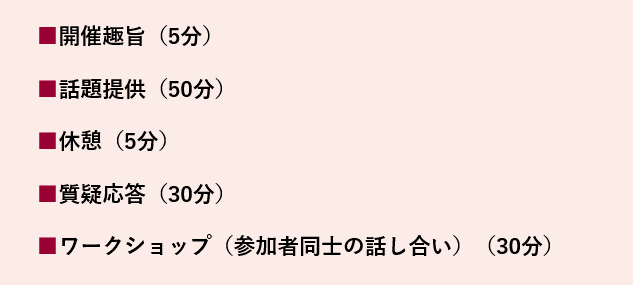

Implementation Report
This year, a total of 6 sessions were held online under the themes of “FD Basic Knowledge,” “Online Classes,” “Learning Support and Special Needs,” “Lesson Design and Lesson Practice,” “Syllabus Creation and Grading,” and “Active Learning,” with a total of 137 participants from all over Japan.
In the participant questionnaire, 95.4% of the respondents answered “satisfied” or “somewhat satisfied” on average for all six sessions.
The factors that led to the high evaluation are considered to be the setting of tasks that go back to the basics of FD training, and the fact that we were able to actively participate in the case reports and provide topics of each university in the midst of the common problem of the coronavirus pandemic, which led to new discoveries.
In the free-form section, “I was able to get an overview of FD and listen to a story that can be used as a reference for creating a syllabus” (1st session), “I was able to share the ingenuity and knowledge of each teacher in class after COVID-19 and obtained meaningful information from the participants that can be used from tomorrow” (2nd session), and “I was able to improve my understanding with easy-to-understand examples such as the flow of determining the legal basis and scope of support” (3rd session). “I also wanted to incorporate a method of having students self-evaluate using a rubric table for the evaluation of report assignments and written exams” (4th session), “I felt that I could use the ingenuity of the teachers in charge of practical classes for my classes after the coronavirus” (5th session), and “There are very few opportunities for FD on student experiments, so I gained a lot of useful knowledge.” (6th session), and both faculty and staff seemed to be able to use it as a reference for improving classes in the future through new learning and awareness.
In the next fiscal year, we will continue to explore themes and times that are in high demand for participants, and proceed with discussions to secure participants from member schools.
Inquiries
University Consortium Kyoto FD Project
TEL 075-353-9163 FAX 075-353-9101
〒600-8216 Shimogyo-ku, Kyoto-shi, Nishitoin-dori, Shiokoji, Shimo-ku, Kyoto, Campus Plaza Kyoto
* Reception hours: Tuesday ~ Saturday 9:00 ~ 17:00 (excluding year-end and New Year holidays)
















